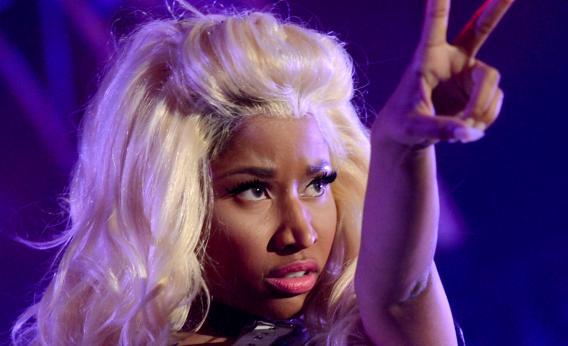On Sunday, Hot 97’s annual Summer Jam concert—traditionally a breeding ground for confrontation and ego-clashing theatrics in rap music—became host to a battle over authenticity and gender. It began early in the day when Hot 97 DJ Peter Rosenberg used some choice words about headlining artist Nicki Minaj and her current club-thumping radio hit “Starships.”
“I know there are some chicks here waiting to sing ‘Starships’ later,” he told the crowd. “I’m not talking to y’all right now. Fuck that bullshit. I’m here to talk about real hip-hop.” Soon word of Rosenberg’s remarks got back to the Minaj camp (namely to her Young Money label head and spiritual leader Lil Wayne), and, at Wayne’s demand, Minaj and the Young Money team refused to take the stage later that evening. Had Minaj performed, she would have likely appeared on stage with special guests Lauryn Hill and Foxy Brown, marking a generation-bridging milestone for women in rap music that could have proved far more entertaining than the feud that unfolded in the days after Summer Jam.
More on that in a sec. But first: Were Rosenberg’s remarks really about Minaj being a woman?
His glib rejection of Minaj’s audience, the “chicks waiting to sing ‘Starships’ “—lumping women in a camp diametrically opposed to his sacred fortress of “real hip-hop”—was legitimately stupid/sexist. In dismissing “Starships,” he dismissed the millions of fans (I’m willing to bet they’re largely female) who purchased the single. The incident perfectly encapsulates the catch-22 female rappers often find themselves in: To achieve the commercial success of their male counterparts they must migrate into pop-star territory, only to be derided by male critics and contemporaries once they do. It’s a dilemma Minaj knows well.
Still, there most definitely were “some chicks” at Summer Jam waiting to hear “Starships.” And that “fuck pop hits” stance is part of Rosenberg’s overarching shtick; his comments seemed to be more about writing off commercial pop music than writing off women. Using a term like “real hip-hop” in 2012, when rap conventions have blurred and crossed over and sampled themselves into oblivion, is supremely silly, but Rosenberg’s also known to honor those outmoded ideas about music purity regardless of gender. (“I just want more hip hop out of him,” he once said about Minaj’s pal Drake.)
But then came the onslaught: Since Sunday afternoon, Minaj has been thrust in the middle of a tug-of-war between two camps of ego-sparring men and left to play diplomat—seemingly stripped of decision-making power but trotted out to patch burned bridges and assign motives. During a heated hourlong on-air phone conversation on Monday night with Hot 97’s Funkmaster Flex, a New York icon in his own right, Minaj explained that she wouldn’t have nixed the performance on her own accord. “No one would have known that I had a problem with any of this. I am not a quitter—I don’t back down from anything … [but] Wayne spoke to me and said, ‘Nick, we’re not doing that show.’ ” Still she refused to let Lil Wayne bear any real responsibility for the spat, explaining that his decision to split taught her a “very, very valuable lesson on knowing my worth.”
Flex, who was insufferably shrill and barky throughout the hour (“Flex, flex. Breathe,” she said at one heated moment), only bolstered Minaj’s eventual argument that this flap was all about gender. He fought Minaj on every point and interrupted her aggressively, particularly when she tried to bring the conversation around to the topic of gender. “I’m holding it down for women—” she’d begin. “I know where you’re going with this,” he’d butt in with an exasperated sigh. “You know Nicki, come on man, it wasn’t about you being a woman.”
That might have been true on Sunday, but it’s hard to imagine Flex manically interrupting Lil Wayne several times a minute on the phone over a live radio broadcast. Or to imagine Lil Wayne letting him. Or to imagine Lil Wayne calling in and dealing with the situation himself, for that matter. The whole dynamic reminded me of the incredible monologue from the 2010 MTV documentary My Time Now, in which Minaj sums up an age-old workplace issue in her own terms: “When I am assertive, I’m a bitch. When a man is assertive, he bossed up.” It also underscored the rule that for a female rapper to rise, she must do so on the back of a male mentor. Lil’ Kim had Biggie, Remy Ma had Big Pun, Nicki has Wayne.
It should seem more like Wayne has Nicki at this point, and he should count his lucky stars for it. For all the shouting and finger pointing that’s happened since Sunday (Rosenberg maintains he doesn’t owe anyone an apology), Minaj has emerged as the grown-up, maneuvering the public discussion with Flex and Hot 97 where she wanted it to go. She’s made the testosterone-fueled DJs looks small and shown the PR skills that have propelled her to megastardom. By standing up for her fans, her label and women in the process, she turned what could have been the “Nicki Minaj Flakes on Summer Jam, Can’t Take the Heat” story into: “I am very proud of my team for taking a stand, for showing me—in turn, allowing me to show my female fans and maybe my gay fans in that audience—that enough is enough. I put in my work.”
